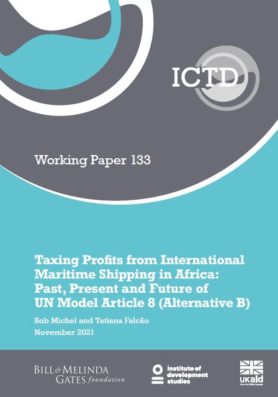Working Paper 133
International maritime shipping is an essential part of global business. Since the establishment of the current international tax regime in the 1920s, there has been a consensus that profits generated by this business are taxable only in the residence state – the state where the shipowners are located. Source states – the port states where business physically takes place – are generally expected to exempt income from international shipping.
This standard is currently reflected in Article 8 of the OECD Model and Article 8 (Alternative A) of the UN Model, and is incorporated in the vast majority of bilateral tax treaties currently in force. Exclusive residence state taxation of shipping profits is problematic when the size of mercantile fleets and shipping flows between two states are of unequal size. This is often the case in relations between a developed and developing country. The latter often lack a substantial domestic mercantile fleet but serve as an important revenue-generating port state for the fleet of the developed country.
To come to a more balanced allocation of taxing rights in such a case, a source taxation alternative has been inserted in UN Model Article 8 (Alternative B). From its inception, Article 8B has been labelled impractical due to the lack of guidance on core issues, like sourcing rules and profit allocation. This gap is said to explain the low adoption rate of Article 8B in global tax treaty practice.
In reality, tax treaty practice regarding Article 8B is heavily concentrated and flourishing in a handful of countries in South/South-East Asia – Bangladesh, India, Indonesia, Myanmar, Pakistan, the Philippines, Sri Lanka and Thailand. All these countries subject non-resident shipping income to tax in their domestic income tax laws. Except for India, all countries are able to exercise these domestic tax law rules in relation to shipping enterprises located in the biggest shipowner states, either because they have a treaty in place that provides for source taxation or because there is no treaty at all and thus no restriction of domestic law.
None of the relevant tax treaties contain a provision that incorporates the exact wording of Article 8B of the UN Model. If other countries, like coastal countries in sub-Saharan Africa, are looking to implement source taxation of maritime shipping income in the future, they are advised to draw on the South/South-East Asian experience. Best practice can be distilled regarding sourcing rule, source tax limitation, profit attribution and method of taxation (on gross or net basis). In addition to technical guidance on tax, the South/South-East Asian experience also provides important general policy considerations countries should take into account when determining whether source taxation of maritime shipping profits is an appropriate target for their future tax treaty negotiations.

